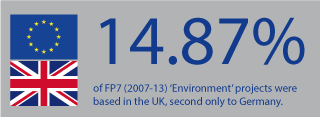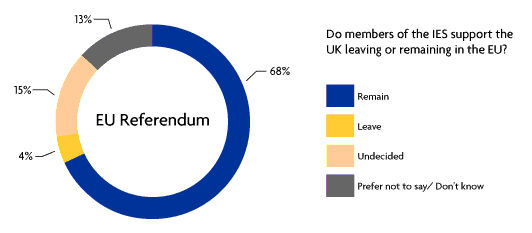Politicians are always keen to talk about how science and innovation can drive productivity and economic growth, but as environmental professionals will recognise, the importance of science to our prosperity and wellbeing is by no means restricted to economics. Our understanding of the links between human wellbeing and changing environmental systems has developed apace in recent years through ecosystem services research. We now face many global challenges, of climate change, growing (and increasingly urban) populations with ever increasing resource demands, pollution of our air, seas and watercourses, species loss and land-use change amongst many others. These are issues with relevance for us all, and if we are to deal with them, we need to encourage research which can develop our understanding of the functioning of socio-environmental systems, promote innovation in ‘greener’, less resource intensive technologies and systems, and strive to ensure the use of evidence in decision-making in government and the private sector.
Science is integral to successful environmental protection and must sit at the heart of our drive to transition to a sustainable society, but crucially this science needs to be inter-disciplinary, collaborative, and often cross-border. The UK has recently been described as a “science superpower” punching above our weight despite the fact that we have fallen behind our competitors in terms of R&D investment. There are various initiatives and mechanisms related to our membership of the EU which contribute significantly to our strength in this area.
Interdisciplinarity and collaboration
Although funding is by no means the only benefit for UK science from EU membership, it is significant, particularly for environmental researchers, due to its support for ambitious inter-disciplinary research.
 Social and environmental processes and challenges do not respect disciplinary boundaries, so funding for interdisciplinary research is essential. Designed to complement the funding systems of individual members states (in theory according to the subsidiarity principle), the EU (through the Framework Programmes, including the current scheme, Horizon 2020, and the European Research Council; ERC) does not tend to fund much basic research, but rather focuses on investigator-led, ‘frontier research’ which spans the fundamental-applied divide. This means funding can be directed flexibly to fields showing promise in a manner often not possible through UK structures.
Social and environmental processes and challenges do not respect disciplinary boundaries, so funding for interdisciplinary research is essential. Designed to complement the funding systems of individual members states (in theory according to the subsidiarity principle), the EU (through the Framework Programmes, including the current scheme, Horizon 2020, and the European Research Council; ERC) does not tend to fund much basic research, but rather focuses on investigator-led, ‘frontier research’ which spans the fundamental-applied divide. This means funding can be directed flexibly to fields showing promise in a manner often not possible through UK structures.
The UK is disproportionately successful in securing funding for research projects in the environmental sciences and other sectors due to the strength of our science base. For example:
- Under the seventh Framework Programme (FP7) from 2007 to 2013, €1704 million was spent on projects falling under the ‘Environment’ theme. Of the 4055 projects funded under the FP7-Environment theme (according to the Community Research and Development Information Services; CORDIS), 603 were based in the UK, second only to Germany, with 645.
- Since 2007, the European Research Council Peer Review Evaluation Panel for Earth System Science (PE10; the panel whose remit most closely aligns with environmental science) has awarded funding for 46 projects to UK host institutions. This is a significantly greater number of projects than awarded to institutions in any other Member State, with France the next highest at 25.
Another advantage of taking part in EU research projects is that the competition and partnerships encouraged by EU grant calls drive ambition and excellence in the UK and other member states. The increased number of eligible institutions across the EU drives up standards and ambition. The collaborations EU projects require can also often generate long-term partnerships.
Science and environmental regulation
Of course, it is not just research scientists who are carefully considering the consequences Brexit could have for the environment and their work: the IES represents professional scientists working across the environmental sector, whose work is significantly shaped and influenced by EU regulations and policies.
The EU has a positive tradition of developing strong environmental regulation, based on consideration of the available scientific evidence. Consequently, the UK’s EU membership has led to the translation into UK law of good evidence-based environmental policy. Without this commitment, there is a risk that environmental standards in the UK could be lowered, thus limiting the ability of environmental scientists to protect the environment. If the UK were to leave the EU but remain a member of the EEA, recent analysis has suggested that these risks would be lessened, but the UK would still be excluded from decision making on EU law and certain key Directives would not apply.
The EU also offers routes for citizens and environmental organisations to hold national governments to account on their environmental commitments, as the current ClientEarth case against the UK Government for not delivering on air quality demonstrates.
It is strongly in the interest of the UK to feed our scientific expertise into EU policy making on trans-boundary environmental issues. We have good track history in this regard: the Urban Waste Water Directive was strongly shaped by UK science, and staff from the Nature Conservancy Council were instrumental in the development of the Habitats Directive and Natura 2000 network of protected areas. Under the Presidency of Jose Manuel Barroso, a UK scientist, Anne Glover, was also appointed the first Chief Scientific Advisor to the Commission. If the UK were to exit the European Union, not only would we lose the ability to politically influence decision making in Europe, UK scientists would be less able to inform the process through formal and informal networks, to the potential detriment of both the UK and EU.
A systems approach
It is clear to environmental scientists that environmental systems rarely reflect political boundaries, and environmental processes and pollutants rarely respect them. As such, regulation and policy developed at EU level is much more effective in addressing environmental challenges. At this scale, policy makers can take a systems approach to what are essentially transboundary issues.
When considering the scale of the environmental challenges we currently face and threats to human wellbeing, it seems that a clear case for collaboration emerges, both in policy-making and research. If we are to succeed in transitioning to a sustainable society we need to encourage innovation, whilst also ensuring policy-makers are equipped with the best available evidence to tackle problems at the appropriate scale. If the UK votes to leave the EU on 23 June, serious and urgent efforts will need to be made to ensure that our scientists are not isolated and that our government continues to seek and heed evidence in policy-making, and takes active steps to establish alternative frameworks for collaboration on trans-boundary issues.

According to a recent survey, the large majority of IES members believe the UK should remain in the EU. Only 4% of respondents to our membership survey indicated support for the UK leaving the EU, whilst more than two thirds (68%) support the UK remaining. A significant group (15%) were undecided with 13% indicating they would prefer not to say.
Find out more about this survey and the views of the IES Council.





